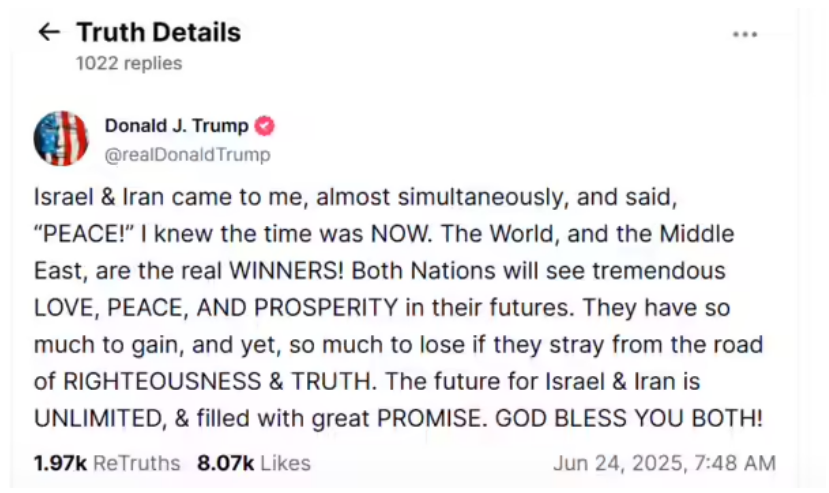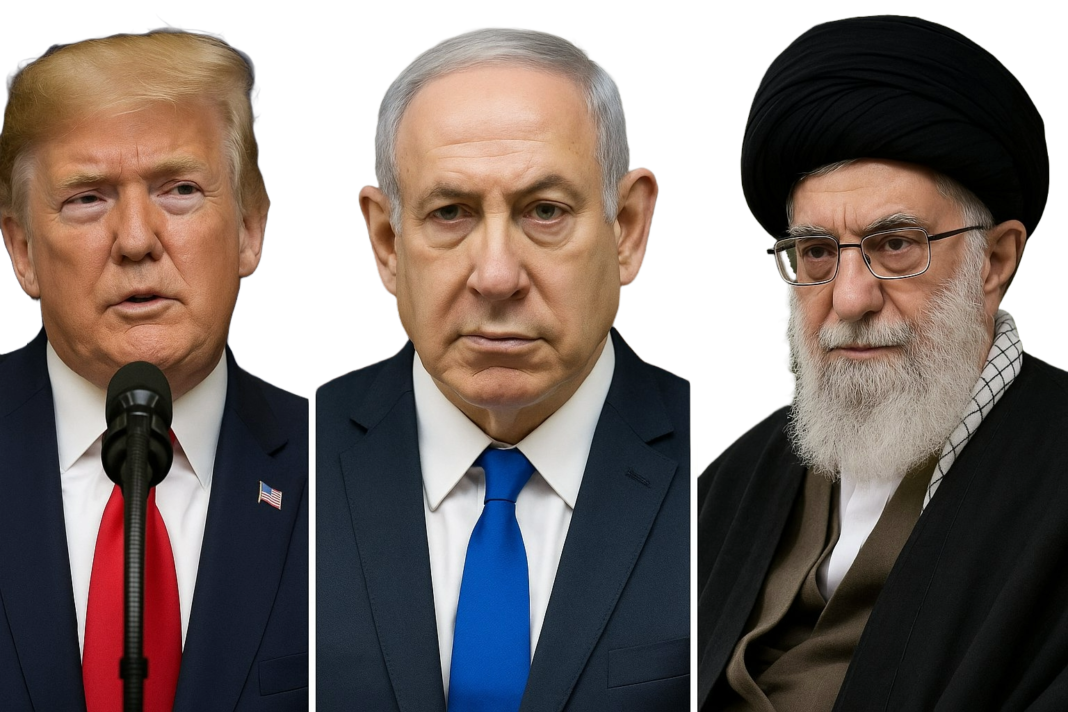By [Piyali Bakshi] June 24, 2025
U.S. President Donald Trump posted on Tuesday, June 24, 2025, on his Truth Social that “Israel & Iran came to me, almost simultaneously, and said, ‘PEACE!’” He described the moment as pivotal. “I knew the time was NOW. The World, and the Middle East, are the real WINNERS!” he added, expressing hopes for “tremendous love, peace and prosperity” in both nations’ future.
According to Trump, Iran agreed to halt hostilities first, with Israel following suit 12 hours later. He celebrated the ceasefire announcement as a personal diplomatic victory, calling it the “official end” of what he had referred to as the “12-Day War.”
“This is a great day for peace,” Trump posted on his social media platform Truth Social. “Israel & Iran came to me, almost at the same time, and said ‘PEACE!’ I knew the time was now.” However, his claims have been met with mixed reactions and outright denials.
Iran Pushes Back on Trump’s Version
Shortly after Trump’s statement, Iranian officials challenged his narrative, stating that the decision to pause military operations was made independently. Iran’s foreign ministry accused Trump of overstating his role, even suggesting that Trump “begged” for a ceasefire following a retaliatory Iranian missile strike on a U.S. base in Qatar.
Iran clarified that while they had decided to halt their offensive around 4 a.m. local time, this was conditional. They emphasized that no binding ceasefire had been negotiated, and any pause in action would only continue if Israel ceased its attacks.
Continued Hostilities Undermine Ceasefire Claims
Despite the so-called truce, missile exchanges resumed shortly. Iranian ballistic missiles targeted Israeli cities in the early hours of Tuesday, marking the fifth such attack in recent days. One missile struck an apartment building in Be’er Sheva, killing at least three civilians and injuring others. Israel responded by intercepting several incoming projectiles but did not immediately comment on the ceasefire status.
The Israeli government has remained tight-lipped, neither confirming nor denying Trump’s claims of peace overtures. Reports suggest internal discussions are ongoing, with the country’s Security Cabinet meeting late Monday night and advising officials not to make public statements.
U.S. Mediation or Miscommunication?
A senior White House official told Reuters that Trump initiated diplomatic outreach by phoning Israeli Prime Minister Netanyahu, then coordinating with Iranian counterparts through channels involving Vice President JD Vance, Secretary of State Marco Rubio, and envoy Steve Witkoff. Until missile fire ceases and official accords are reached, the region remains on edge, and Trump’s role—as peacemaker or self-promoter—remains under scrutiny.
A Fragile Pause, Not a Peace Deal
At first glance, Donald Trump’s announcement of a “complete and total ceasefire” between Israel and Iran appears to be more symbolic than substantive. While he portrayed it as a diplomatic victory, neither Israel nor Iran officially confirmed such an agreement. Instead, both sides continued exchanging fire even after the supposed truce began. Iran’s conditional willingness to halt attacks and Israel’s silence suggest no binding deal was reached. This reflects a pattern in Trump’s approach—prioritizing public declarations over concrete diplomatic outcomes. The situation remains unstable, and without formal commitments or verification, the ceasefire seems more like a fragile pause than a genuine step toward peace.








